The Moral Dilemma Behind the “Wirkin”
On the left - A Wirkin. On the right: the real deal.
The lack of transparency around the products we consume is one of the greatest threats to humanity that remains widely unacknowledged. While many of us are familiar with “MADE IN CHINA” stamped on countless everyday items, the average consumer rarely stops to reflect on the origins of these goods or the journey they took to reach us. This lack of reflection extends to how we dispose of these items, contributing to devastating environmental consequences: trash piles visible from space, microplastics infiltrating fish, and PFAS contaminating water supplies. The list is endless.
Where most people see a price tag, I see the entire process behind a product—a process worth dissecting. Take, for example, the “Wirkin,” a $78 Hermès-inspired bag available at Walmart. On the surface, it seems like a convenient, affordable alternative. But what makes the Wirkin possible at such a low price? And at what cost?
Breaking Down the Numbers
Big-box retailers typically mark up their products by 400% to 800% over material and labor costs. At $78, this suggests that the Wirkin’s raw cost is roughly $19. Such a low figure raises troubling questions about labor conditions and material integrity. The average Chinese factory worker earns just $3 an hour, making it difficult to imagine workers earning more than a dollar or two per bag. What kind of materials can be sourced at such a low cost? Are tanneries producing leather for under $20 per piece, or is the bag simply a piece of plastic dressed up as “luxury”? How much do the workers who assemble these bags earn—a dollar or two per bag, if that?
The lifespan of a synthetic bag pales in comparison to that of a genuine leather item, yet its environmental footprint—from petroleum-based materials to landfill waste—is significantly higher. What’s clear is that the true cost of these dupes far exceeds their price tag. Sure, a dupe offers a “luxury look” for a fraction of the price, but few people stop to consider that some luxury items cost more because they have to.
The Ethical Paradox of Luxury
The Birkin bag, by contrast, is the gold standard of craftsmanship and exclusivity, yet its production costs fall far short of its retail price. Industry estimates suggest it costs Hermès $800 to $1,400 to produce a Birkin, a figure that reflects premium materials and meticulous craftsmanship. Hermès artisans train for 18 months to perfect their techniques, yet their starting salaries reportedly hover around €1,700 per month. For a company that grossed €11.2 billion in 2024, such wages underscore a troubling disparity between brand image and internal equity.
A glimpse into the craftsmanship techniques of Hermès
The luxury paradox lies in the symbolic nature of these items. Consumers pay thousands not for the material value, but for the story and status they confer. While Hermès may streamline its operations by owning its tanneries and eliminating middlemen, its inability to fairly compensate artisans raises questions about the ethics of even the most celebrated luxury brands.
A Call for Change
These moral dilemmas drive my passion to challenge the status quo of product development in the fashion industry. The consequences of our negligence—social, economic, and environmental—are profound. Yet, the disconnect remains: much of the industry’s labor is outsourced to countries far removed from our daily lives, shielding consumers from the harsh realities faced by workers. We may pity the working conditions of others, but few stop to consider how deeply intertwined we are in perpetuating their suffering.
What’s more, we hold the power to change it. By prioritizing transparency, ethical practices, and sustainability in our choices, we can collectively shift the narrative, slowly closing the gap between convenience and conscience. It’s not just about consuming less but about consuming consciously—because the true cost of a product extends far beyond its price tag.
References
Leathertainment Podcast EP04 w/ Peter Nitz (Atelier Peter Nitz) - Watch on YouTube
"Factory of the World: Scenes from Guangdong" - Places Journal
"The Secret Economics of the Birkin Bag" - The Economist
"Hermès and the Success of the Coveted Birkin Bag" - 60 Minutes
"Hermès - PR - 2024 Third Quarter Revenue" - Hermès Financial Reports
“Inside the Hermès Workshop That Makes Its Iconic Bags” - Vanity Fair
Photos: Diet Prada and Vanity Fair



